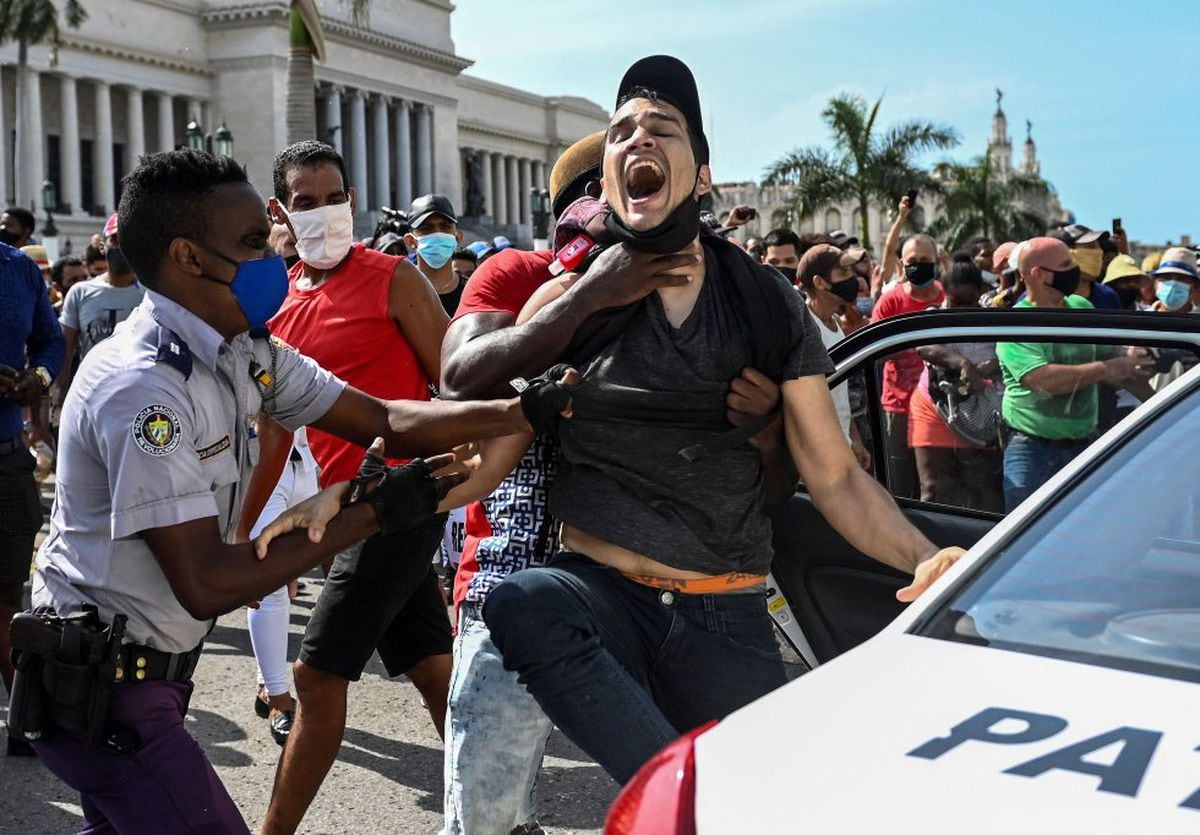The Supreme Court of Cuba (TSC) announced on Wednesday the rulings of six trials held against 129 Cubans who participated in two large protest demonstrations against the Government held on July 11 and 12 in Havana, which resulted in violent and clashes with the police.
The accusations were for theft and sedition, and the penalties imposed by the courts were very high: 31 people were sentenced to prison terms of between 20 and 30 years, 25 to sentences of between 15 and 19 years in prison and 48 more people to sentences between 10 and 14 years in prison.
Only one of the defendants was acquitted, and another received a four-year sentence of "correctional labor without internment."
Although various sources and relatives of the defendants had previously reported that numerous people had already been sentenced in various parts of the country to high penalties for the unprecedented protests that shook the country on July 11 and 12, it is the first time that the authorities offer official data of the judgments of these macro-processes.
According to the Cuban Attorney General's Office, 790 people have been prosecuted in the country for the July protests, of which 55 are 16 and 17 years old.
The trials against the 129 people took place between December 14 and February 3, and involved the participants in the demonstrations that took place in two neighborhoods of Havana, the corner of Toyo, in the municipality of Diez de Octubre, and in the working-class neighborhood of La Güinera, where one person was killed by police shots.
What happened in Toyo and La Güinera had wide repercussions and shocked the country, because unlike what happened in other cities and towns, where the demonstrations were mostly peaceful, here they led to a true pitched battle, with police patrols overturned and harsh clashes between law enforcement officers and riot police against demonstrators, something that had never happened before in Cuba.
The TSC considers "tried and proven" that the convicts - of whom their age is not stated, but who apparently are mostly young - "attempted to violently subvert the constitutional order" by obeying "instructions given by people both from Cuba and from the Exterior".
In the case of the events at the Toyo corner, it is stated that the demonstrators “threw stones and bottles at several officials” and “installations of the National Revolutionary Police, patrol cars;
They overturned a motorcycle and cars belonging to the Municipal Assembly of Popular Power and caused injuries to other people and serious material damage.”
In La Güinera, the TSC says that "they threw stones, sticks, bottles, and Molotov cocktails at agents" and "other workers from state institutions (...) who caused injuries,"
The high court highlights that the trials took into account "the seriousness, harmfulness and violence of the acts committed", as well as that the "events were deliberately organized in the midst of the complex situation that the country was going through, as a consequence of the pandemic of covid-19, particularly in the province of Havana, reasons why exceptional measures had been taken to counteract its effects, which included, among others, the limitation of movement and social isolation.”
The information from the Supreme Court does not refer to the ages of those convicted, but according to the NGO Prisoners Defenders, among them there are seven young people aged 16 and 17, who have received sentences of between 7 and 19 years in prison, and another one, who received the correctional labor sentence.
In Cuba, the age of majority is 18 years, but criminal responsibility is at 16 years —the Penal Code contemplates the possibility of reducing the penalties for minors by half—.
Much criticized has been the use of the criminal concept of "sedition" to prosecute the participants in the July protests, the largest in 62 years of revolution.
Article 100 of the Penal Code in force in Cuba states that they incur in this crime, punishable by sanctions of 10 to 20 years in prison, or the death penalty, to those who “riotously and through express or tacit concert, using violence, disturb the socialist order or the holding of elections or referendums, or prevent compliance with any sentence, legal provision or measure issued by the Government, or by a civil or military authority in the exercise of their respective functions, or refuse to obey them, or make demands, or resist fulfilling their duties.
In 1994, after the 'Maleconazo' incidents, the largest protests against the government up to that time, which were much smaller and focused only on Havana, the Cuban courts sentenced hundreds of people for public disorder, but with sanctions one year in prison in most cases.
For this reason, the high sentences of now and the use of the crime of sedition have raised great dust.
The Cuban government denies that the protests of July 11 and 12 were a spontaneous outbreak and blames Washington for encouraging the "destabilization" of the country and generating a "situation of ungovernability."
Cuban academics, sociologists, historians and artists have publicly expressed their rejection of excessive and exemplary sentences, asking the authorities for magnanimity and judging only those who participated in violent acts, and there are even those who have asked for an amnesty.
The TSC assured that the convicts were put on trial respecting all procedural guarantees and that they have the right to file an appeal before the Supreme Court.
Yesterday it was also learned that a court in the Cuban province of Matanzas began to prosecute 17 detainees during the unprecedented protests of July 11 in the city of Cárdenas, with prosecutors requesting up to nine years in prison for the
crimes of public disorder, contempt and attack.
Subscribe here to the EL PAÍS América newsletter and receive all the key information on current affairs in the region

